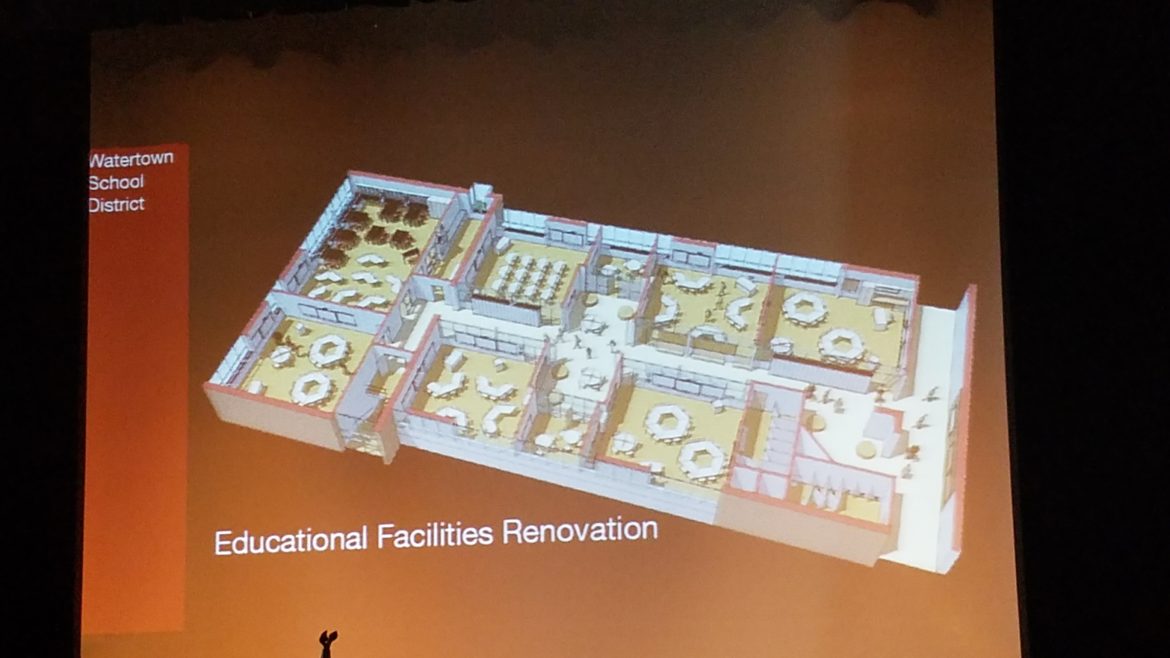
Charlie Breitrose
A drawing of what a 21st Century classroom wing could look like if the layout is changed. There are more learning spaces.
Watertown’s master plan for renovating the town’s five public schools is almost complete, but school and town officials – and the community – must decide which order to do the work and what to what extent the renovations should go.
The Watertown Schools Master Plan Steering Committee wrapped up months of work Wednesday night by giving their final thoughts about the draft of the master plan being put together by consultants from SMMA.
“It has been a great group, with lots of perspectives,” said School Committee Chairman John Portz, who chaired the group that began meeting in June.
The plan includes an estimate for renovating Watertown High School, Watertown Middle School, and the three elementary schools – Cunniff, Lowell and Hosmer. Basic renovations, just to fix current issues, would cost about $160 million at current construction costs, while improving them to meet 21st Century standards the cost would be $200 million in current costs, said Town Councilor Vincent Piccirilli, who is on the Steering Committee.
With schools built for 21st Century learning, classrooms and other rooms are more flexible, lend themselves to group projects and allow teaching lessons using multiple subjects. The current schools can be turned into these kinds of schools if the current classrooms wings are reconfigured inside, said Michael van Hamel of SMMA during a community forum over the summer.
SMMA’s Joel Seely said the costs break down into about 75 percent construction and 25 percent other costs – including furnishings, equipment, educational technology, utilities and fees. He added that the costs will likely increase in future years.
The town could get some reimbursement from the Massachusetts School Building Authority, if a project is accepted. That can take a long time, however, because the state only funds a handful of full school renovations or reconstructions each year. In Belmont, for instance, they got accepted into the state program to renovate their high school after 10 years.
SMMA did not include estimates for state reimbursement because the amount that each community receives differs, and changes each year. Last year, the rate Watertown would have received was about 48 percent. Also, there is no guarantee Watertown would have one or more of its schools accepted.
Watertown has already tried to get funding to renovate Watertown High School. This year they submitted a Statement of Interest for the third time to try to get state reimbursement. If unsuccessful again this time, Steering Committee was not sure whether next year the district should apply for Watertown High School again, or try an elementary school, where class sizes are growing fastest.
Which sequence, or order, the schools should be renovated remains up in the air. The group agreed that the elementary schools need help with overcrowding, so that might be the place to start.
Plans call for expanding Cunniff Elementary from around 300 to about 400 students by adding a second level to one wing. Lowell would be slightly expanded to 450, but the Hosmer would be cut down by about 80 students to 500.
“We could do Cunniff first and reduce class sizes at all schools,” said former School Committee member Michael Shepard, who is on the Steering Committee.
Steering Committee member Chris Lowry said there could be a few ways to look at the sequencing: the most economical way, the one that is best for education of students, and which school needs the work most desperately.
The district is kind of hamstrung by the current facilities, and a lack of space to put a new school. Steering Committee member Elaina Griffith said that they can’t shrink one school without expanding another first.
The consultants will take the committee’s final comments and come back in two to three weeks with the final Master Plan report, Seely said. The report will be presented to a joint meeting of the School Committee and the Town Council, Portz said, likely after Thanksgiving.
After that, community forums will be held where the order in which schools should be renovated, and whether they should have basic renovations, or upgrade for modern education techniques. These will likely happen after the New Year.